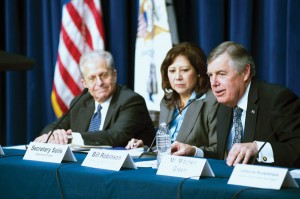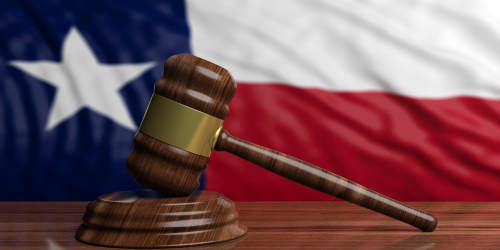Labor Department, ABA Join on Lawyer Referral

ABA President-elect Wm. T. (Bill) Robinson III (right) at White House program announcing collaboration. Photo by Lisa Helfert
California lawyer Sheldon Warren believes the advantages of the ABA’s approved lawyer referral program go two ways.
Consumers benefit from being linked to lawyers with experience to handle their legal problems, says Warren, a Long Beach lawyer and chair of the ABA Standing Committee on Lawyer Referral & Information Service. And the profession’s image benefits from satisfied clients.
“I’ll tell you what,” Warren says. “Folks who go through lawyer referral services and get help when they have a problem—they’re not the ones who joke about lawyers.”
Warren is applauding a new collaboration between the ABA and the U.S. Labor Department’s Wage and Hour Division that will bring more clients to legal referral services.
As of Dec. 13, some workers with complaints not resolved by the Labor Department have another option: Find a lawyer through the ABA-approved lawyer referral program.
Warren traveled to Washington, D.C., for the Nov. 19 announcement by Vice President Joe Biden. ABA President-elect Wm. T. (Bill) Robinson III also spoke at the news conference, praising the new venture as “an exciting day for the American Bar Association.” Robinson is the member in charge of the Florence, Ky., office of Frost Brown Todd.
In a typical year, more than 35,000 workers contact the Labor Department’s Wage and Hour Division with complaints. Thousands can’t be resolved because of limited capacity.
Now workers with unresolved complaints under the Fair Labor Standards Act or the Family Medical Leave Act will get a letter explaining their rights and offering a toll-free number linking them to ABA-approved lawyer referral programs. If they sue and win, they have a statutory right to attorney fees.
CONSUMER PROTECTION
ABA-approved referral programs comply with the association’s Model Supreme Court Rules Governing Lawyer Referral and Information Services. Those rules call for consumer safeguards such as verification that participating lawyers are members of the bar and have malpractice insurance or proof of financial responsibility. Services in the ABA network also must screen lawyers to make sure they have sufficient experience to handle cases in the subject areas they sign up for. And clients can’t be charged a fee to seek a lawyer through the service.
Seventy lawyer referral programs have won ABA approval, giving them the right to sport the ABA logo and the phrase “the right call for the right lawyer.” Of that number, 38 programs in 20 states are participating in phase one of the Labor Department collaboration with the ABA.
Warren says the Labor Department contacted the ABA last year because it wanted to formalize a referral process taking place in some offices on a more informal basis. The aim was to make sure that workers were referred to attorneys with expertise in their areas of need.
In the interim the ABA got to work. It helped set up the toll-free number and reached out to its certified referral programs to find out which ones were interested in participating. It worked on criteria for lawyers authorized to take FMLA and FLSA panel cases and a method to measure results without revealing client confidences.
Warren views certified referral programs as the best way for moderate- and low-income individuals to find a lawyer. “A lot of folks, moderate and middle income, simply don’t know how to find lawyers who are capable and insured,” says Warren, who has been involved in lawyer referral services since 1981.
ABA President Stephen N. Zack praises the collaboration as ground-breaking and a win-win for all.
“As lawyers, it’s at the core of our beliefs that people with serious legal needs should be able to readily find good representation,” says Zack, administrative partner in the Miami office of Boies, Schiller & Flexner. “This project fills an important need, and the impact of seeing people with serious legal problems easily find good, qualified help should make this an effort that has a long, long life.”



